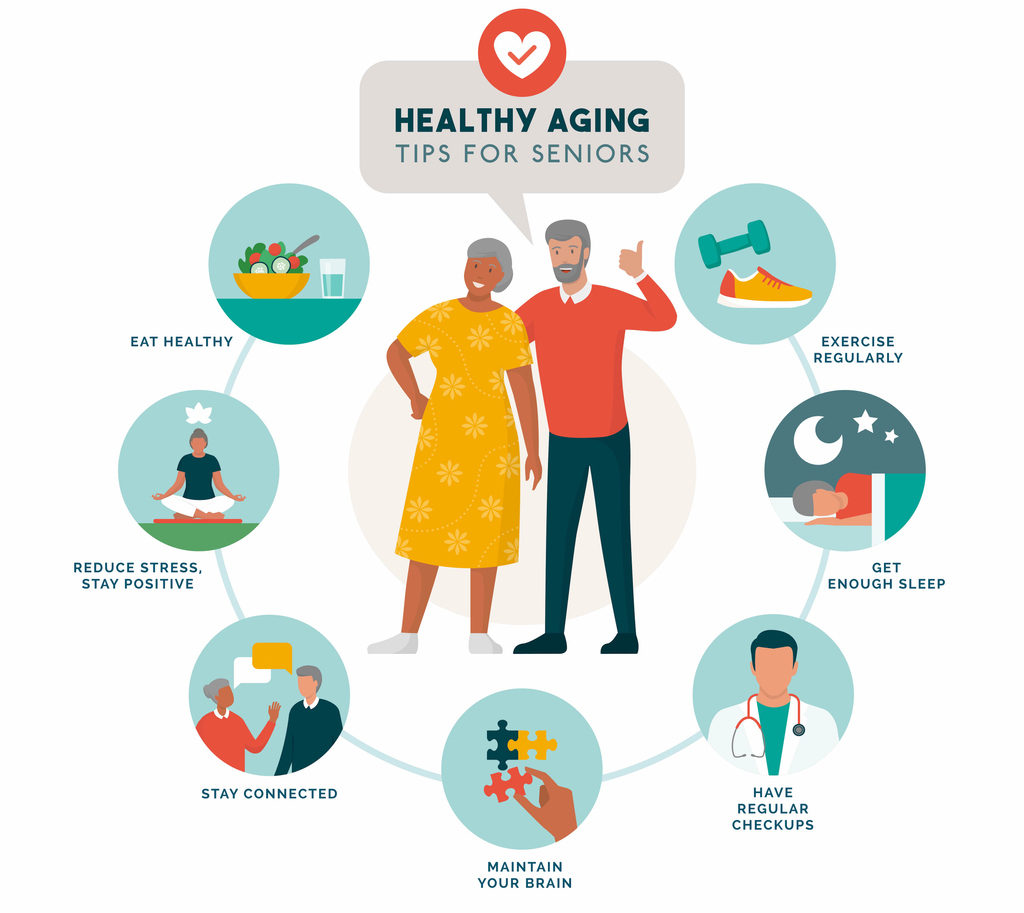As we age, maintaining good health becomes increasingly important to enjoy a fulfilling and active lifestyle. The key to successful aging lies in adopting preventive measures that can safeguard against common diseases associated with growing older. In this article, we'll explore essential strategies to promote healthy aging and reduce the risk of age-related diseases.

Prioritize a Balanced Diet:
A nutritious and well-balanced diet is a cornerstone of healthy aging. Include a variety of fruits, vegetables, whole grains, lean proteins, and healthy fats in your meals. Adequate nutrition supports overall health, boosts the immune system, and helps manage weight, reducing the risk of chronic diseases such as heart disease, diabetes, and certain cancers.
Stay Physically Active:
Regular physical activity is crucial for maintaining mobility, flexibility, and cardiovascular health. Engage in activities that you enjoy, whether it's walking, swimming, yoga, or gardening. Aim for at least 150 minutes of moderate-intensity exercise per week, along with strength training exercises to preserve muscle mass and bone density.
Keep Your Mind Active:
Mental stimulation is vital for preventing cognitive decline and age-related conditions such as dementia. Challenge your brain with activities like puzzles, reading, learning new skills, or engaging in social interactions. Stay curious and continuously seek opportunities to expand your knowledge and mental agility.
Prioritize Adequate Sleep:
Quality sleep is essential for overall health and well-being. Aim for 7-9 hours of sleep per night to support cognitive function, mood regulation, and immune system function. Establish a consistent sleep routine and create a comfortable sleep environment to enhance your sleep quality.
Manage Stress:
Chronic stress can contribute to a range of health issues, including heart disease and mental health disorders. Adopt stress management techniques such as meditation, deep breathing exercises, yoga, or spending time in nature. Cultivate a positive mindset and develop coping mechanisms to navigate life's challenges.
Regular Health Check-ups:
Routine health check-ups and screenings are crucial for early detection and management of potential health issues. Schedule regular visits to your healthcare provider for preventive screenings, vaccinations, and discussions about your overall health. Addressing health concerns proactively can significantly impact the trajectory of age-related diseases.
Maintain Social Connections:
Social isolation can have detrimental effects on mental and physical health. Foster meaningful relationships, stay connected with friends and family, and engage in social activities. Strong social ties contribute to emotional well-being and provide a support system that enhances overall quality of life.
Practice Good Hygiene:
Maintaining good hygiene is essential for preventing infections and promoting overall health. Regular handwashing, proper dental care, and vaccinations can protect against common illnesses and contribute to a healthy immune system.
Limit Harmful Habits:
Avoiding harmful habits is crucial for healthy aging. Limit or quit smoking, reduce alcohol consumption, and avoid excessive sun exposure to lower the risk of age-related conditions such as cardiovascular disease, respiratory issues, and skin cancer.
Stay Informed and Proactive:
Stay informed about your health and be proactive in making lifestyle choices that contribute to well-being. Keep up-to-date with medical advancements, seek professional advice when needed, and actively engage in decisions related to your health.
Preventing old age diseases is a holistic endeavor that involves a combination of lifestyle choices, proactive healthcare, and a positive mindset. By adopting these strategies, you can significantly enhance your chances of aging healthily and enjoying a fulfilling and active life in your later years. Remember, it's never too late to start incorporating these habits into your daily routine for a healthier and happier future.

